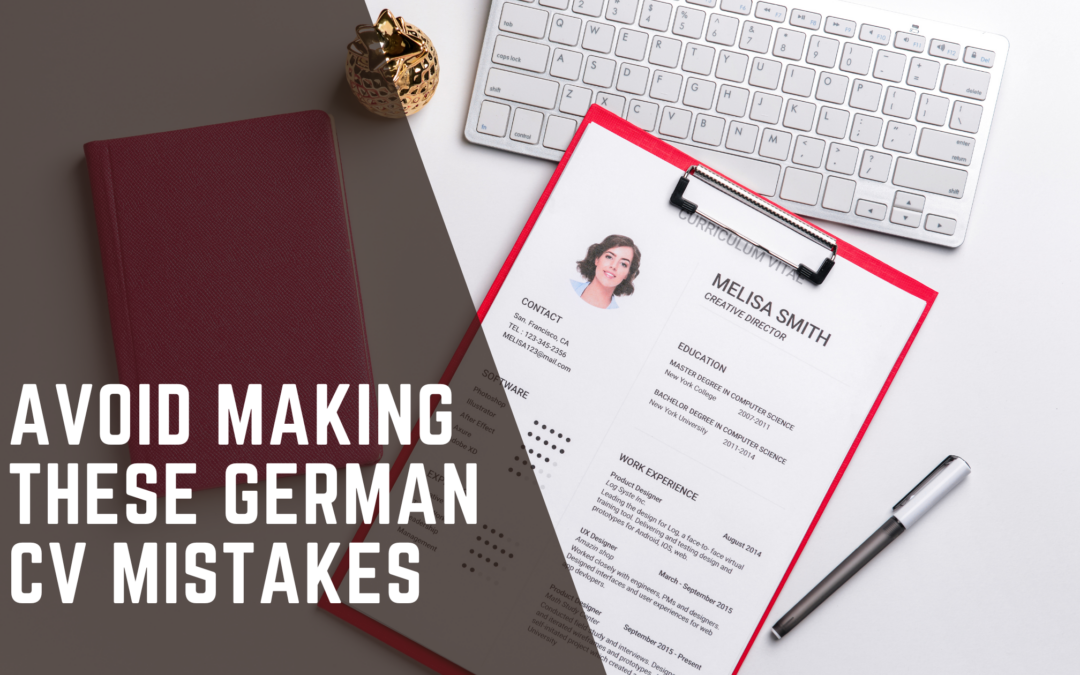AVOID MAKING THESE GERMAN CV MISTAKES
As an experienced career coach helping people find work in Germany, I spend a lot of time researching what others say to remain updated on current trends and, more importantly, sort out the good information from the bad.
Sadly, there’s shockingly a lot of terrible advice out there. This misinformation can be found in various publications and/or touted by influencers, many of whom lack any qualifications to dole out job search or career advice. If they were recruiters or other HR specialists, that would be one thing, but getting career advice from someone who just moved to Germany and works a general tech job is akin to self-diagnosing a disease by using WebMD versus seeing an actual doctor.
Let’s dispel some popular myths about German CVs to help you sort out what’s true and what’s false and ensure you don’t make these common German CV mistakes yourself.
Join Our Community
Stay ahead with the latest news on immigration developments, employment opportunities, and other updates about life in Germany. Get valuable insights, early access to Berlin Life guides, invites to community events, and more. Don’t miss out – subscribe to one of the most popular newsletters in Berlin.

COMMON GERMAN CV MISTAKES
These are some of the most common mistakes that people mistake with their German CVs.
Recommended reading: For the complete lowdown on how to write a German CV, view our super detailed and helpful guide.
1) Stuffing Your CV With Keywords
People talk about how companies use applicant tracking systems (ATS) to scan CVs for keywords and present them with the top candidates. They encourage heavy keyword stuffing techniques on CVs that make your text appear unnatural and as if it were written by a robot.
This is one of the biggest myths out there and after personally talking with multiple recruiters in Berlin and accounting for my personal experience as a hiring manager, I can confidently confirm that humans read and make decisions on all job applications.
So write your CV for human consumption and don’t rig it full of keywords for ATS purposes. The only place your profile needs to be optimized for keywords is on job search platforms like LinkedIn or Xing.
Recommended reading: What Are The Best Berlin Job Search Websites?
2) Altering Your CV Based On German Stereotypes
Many go on about how Germans are this way or that way, reinforcing outdated and offensive stereotypes.
Examples include people saying things like Germans are direct, efficient, and <insert another stereotype here> to explain why CVs should only be 1-2 pages max. They claim that Germans don’t like CVs with different colors, fonts, and font sizes.
Having a CV that doesn’t span multiple pages or creating one that’s easy to read has nothing to do with German culture or preferences but are simply basic principles for putting a CV together.
3) Oversharing Personal Information
They advise sharing all sorts of personal information such as your date of birth, marital status, and the number of children you have.
Sharing these details introduces unnecessary bias into the recruiting process and could cause employers to make snap decisions about you, such as rejecting you for not living close enough to the office or assuming that your kids will see you taking numerous sick days.
None of this information is relevant during the recruiting process and even beyond. Date of birth, marital status, and the number of children should never, ever be included on a CV. Such information will be needed later for payroll purposes, but only after you’ve been hired for the job.
4) Adding Photos
People will also instruct you to include a photo on your CV and that adding one is a “must”. They say that an employer can tell a lot about your level of “professionalism” based on how you look in a photo instead of actually just reading about your education, experience, and skills.
While adding a photo is widely practiced, you don’t need to include one unless you want to and these days, more and more employers ask applicants not to include their photo on their CVs.
Recommended reading: German CV Photos – Are They Even Necessary?
5) Explaining Employment Gaps
It’s also advised that you need to explain employment gaps on your CV and that failing to do so creates a bad impression. The fact that you took time off at any point in your life is no business of your potential employer and shouldn’t influence their decision to invite you to a first interview.
You can explain gaps if you like, but don’t feel compelled to do so. If you are comfortable sharing this information, Indeed has some great tips about how to approach employment gaps.
6) Incorporating A Signature
Another weird myth is that you should include your signature on your CV because “Germans love signing things”. Aside from this being another horrible stereotype, this adds zero value to your CV and should never be included, period.
7) Writing Your CV In German
Another one of the common German CV mistakes? It’s often advised that you write your CV in German, even if you don’t speak German well or at all. This provides your potential employer with the impression you have language proficiency when the reality is different. While it can help you get noticed by employers who may still want to hire you despite the language barriers, you may not want to take this chance. If you decide to write your CV in German, at least indicate your true language level and be sure to feature it quite prominently.
8) Not Adding Hobbies To Your CV
If you’re tight on space, you can leave out this information, but it’s actually fairly commonplace to add your hobbies and interests to your German CV. It makes you appear more human, shows that you have interests outside of work, and can even be used as an icebreaker during interviews. For example, I’ve personally asked candidates about their hobbies during interviews as a technique to get to know them better and help them feel welcomed and relaxed.
9) Customizing Your CV For Job Applications
There are certain areas of a CV that you can customize for job applications, but keep the changes to a minimum. Cover letters are way more important to personalize than CVs.
These are the CV elements that you could slightly adjust and reword for a job application:
⭐ Professional experience or “about me” statement
⭐ Skills
⭐ Responsibilities and accomplishments attached to your professional experience
Say you’re applying for a certain job, like product manager. You’d read the job description posted on the company website and then pull certain words or phrases from that and incorporate it naturally into your CV (see the above advice about keyword stuffing).
10) Going Over the Two Page Limit
A German CV should never be more than two pages. Anything more than this will bore the reader who may toss your CV in their “no pile”.
If you can’t find a way to summarize your career in two pages and still have more information to share, add a sentence (with a clickable link) on your CV to indicate there is more to see on your LinkedIn profile, social media channels, and/or your personal website. If your potential employer is interested in learning even more about you, they’ll definitely go there to view the information.
Be sure to follow The Berlin Life on LinkedIn for exciting updates.
11) Deprioritizing Readability
Another of the typical German CV mistakes is forgetting about the readability of their CV. Knowing the two-page maximum, many job applicants resort to desperate measures to cram as much information as possible into their CVs. They do things like decrease the font size to the point that it’s unreadable or decrease the margin size so that words appear spilling off the page. Others use fancy script fonts that aren’t easy to read, loud text colors in red or orange, and inconsistent font sizes and stylings for heading and paragraph texts. Some CVs are so dense with text that you get a headache just looking at the page.
When writing your German CV, keep the default margins in place. Be consistent with your font size and styling for your text. Use basic fonts that are large enough that people don’t need to squint when reading. Avoid using colors other than black or grey. Allow for ample white space to break up sections of text.
The bottom line is to be careful about the information you consume and look at who’s giving the advice. Seek out official sources or knowledgeable people you can trust.
Are there any other German CV mistakes we’ve missed? Let is know in the comments.
RELATED CONTENT
What Are The Most Highly Demanded Jobs In Germany?
If you want to move to Germany for work, review these highly demanded jobs in Germany and learn how to make your move a reality.
The Reality Of Finding Work In Berlin In 2024
Is it easy to find work in Berlin? Learn about some the realities of finding a job in Berlin during normal times, never mind *right now*.
Companies In Berlin Hiring Right Now
Are you looking for a job in Berlin? Then check out this ever-growing list of companies in Berlin that are hiring right now.

Cheryl Howard, Founder @ The Berlin Life
Hi, I’m Cheryl. My mission is to help you move to Berlin and find work.
A Canadian in Berlin for 10+ years, I have the unique experience of moving to Berlin – not once, but twice. During my time in Berlin, I’ve had five different visas and worked as both a freelancer and a permanent employee for numerous Berlin companies. I even managed to find a new job during the pandemic and again in 2023, during Germany’s recession and massive layoffs in tech.
My day job has involved work as a hiring manager, overseeing the recruitment of countless people, as well as a team coach helping teams and individuals work better and find happiness in their careers. Through my side projects, I’ve also shared my personal experiences by publishing a series of helpful blog posts, creating a thriving community of job seekers, and hosting events to help people find work in Berlin. In 2021, I decided to put my coaching and recruiting talents to use by creating The Berlin Life, bringing my existing content and community together in one spot.
The combination of my personal and professional experience means I know exactly what it takes to move to Berlin and find work.





